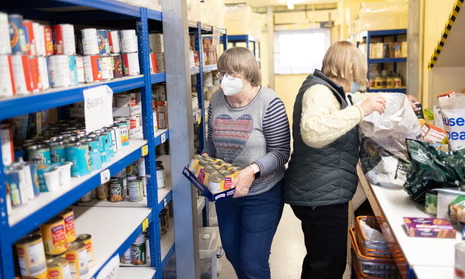Across Kent, food banks are facing one of the most challenging periods they’ve seen in years. Demand for emergency food parcels has been rising sharply, while donations from the public have steadily decreased. For volunteers, community organisations, and families relying on this support, the situation has created a growing sense of urgency, prompting calls for immediate action and stronger support systems.
Food banks have long served as a lifeline for households struggling to make ends meet. In recent years, financial pressures — from rising rent and food prices to energy bills and transportation costs — have stretched budgets thin for many families. While the cost-of-living crisis has eased slightly in national figures, local communities say the reality remains difficult. In counties like Kent, the pressure on low-income families is still immense, and food banks are often the first place they turn when money simply runs out.
Volunteers working at food banks in Kent describe a noticeable shift in the types of people seeking help. It is no longer only those who are unemployed or struggling with long-term financial hardship. Increasingly, people with full-time jobs, single parents juggling multiple responsibilities, pensioners living on fixed incomes, and young adults facing unstable housing are among those lining up for food parcels.
Many volunteers have said the phrase they hear most often is: “I never thought I’d need to come here.” The emotional toll of that reality is not lost on the people handing out the food. For them, every story reinforces how widespread and deep-rooted the crisis has become.
One of the biggest challenges facing food banks today is the decline in donations. Traditionally, local residents have supported food banks generously, contributing everything from tins of soup and pasta to toiletries and household essentials. However, with most households also feeling the pinch from rising costs, the number of people donating has dropped. Even those who continue to give often say they cannot donate as much as they used to.
Supermarket collection points — once overflowing during peak donation periods — now report fewer contributions. Some food banks say they are receiving only half the goods they used to collect at the same time last year. In rural areas of Kent, the decline is even more noticeable, as smaller communities with fewer resources are struggling to keep up with demand.
To cope with the decline, several food banks have had to reduce the variety of items they offer. Essentials such as long-life milk, rice, tinned vegetables, cereal, baby formula, and sanitary products are among the goods that frequently run low. Volunteers say that while they try to curate balanced parcels with protein, carbohydrates, fruits, and household basics, shortages sometimes force them to substitute items or reduce the number of portions.
The strain has become so intense that some food banks have begun limiting how often individuals and families can collect parcels. This is a measure many organisations hoped never to adopt, as their mission has always been to provide as much support as possible without restrictions. But with shelves becoming emptier, they say they must make difficult choices to ensure supplies are shared fairly.
Another major concern is the emotional and psychological impact on those seeking help. Many residents feel embarrassed or ashamed when they walk into a food bank for the first time. Volunteers in Kent have worked hard to create a welcoming, judgment-free environment. Some food banks have even redesigned their spaces to look more like small community shops rather than hand-out centres, giving visitors a sense of dignity and choice.
Still, volunteers say they see the emotional strain on people’s faces as they walk through the door. Parents express worry about feeding their children, young adults fear they won’t make rent, and elderly individuals quietly admit they skip meals to stretch their pensions. The stories paint a picture of a county where economic pressure is touching every corner of society.
Local charities have also highlighted a troubling rise in working-poor families needing support. These are households where adults are employed — sometimes in more than one job — yet still cannot afford basic living costs due to rising prices and stagnant wages. Without food banks, many of these families say they would be forced to choose between paying their energy bills and feeding their children.
While donations are down, the dedication of volunteers remains unwavering. Many volunteers give hours each week to sorting food, assembling parcels, and delivering support to families who cannot travel. Some speak about the emotional bond they develop with the people they help, saying that seeing the relief on a family’s face keeps them motivated even on the most difficult days.
Several food banks in Kent have also started collaborating with local schools, churches, and community centres. These partnerships aim to raise awareness, increase food collections, and distribute support more efficiently. In some areas, schools now provide breakfast bags to children from struggling households, ensuring they start the day with a nutritious meal.
Local leaders have started raising concerns as well. Councillors across various districts in Kent say they are worried about how long food banks can continue operating under such pressure. Many are calling for more substantial support from national government, including targeted cost-of-living measures, grants for food charity organisations, and expanded support for low-income families.
Some food banks have introduced new services alongside food distribution. These include financial literacy workshops, debt advice sessions, and mental health support referrals. Volunteers say they often meet individuals dealing not only with hunger but with anxiety, depression, and financial stress. Offering additional support can help families regain stability and reduce long-term reliance on food aid.
Although the situation is challenging, there have been moments of hope. Community events, small local fundraisers, and initiatives organised by schools have helped refill shelves during critical periods. Some kind-hearted residents have begun “reverse advent calendar” drives, where people donate a food item each day in December for families in need. Local businesses have also stepped up, offering bulk-buy donations and encouraging customers to contribute at checkout.
Food banks in Kent say what they need most right now is consistent support. They are encouraging residents who can donate — even small items like tinned beans, pasta, tea bags, or toiletries — to do so regularly. They are also asking the government to recognise food banks not as a “temporary safety net,” but as an essential pillar of community support during ongoing economic instability.
As the winter months approach, the pressure on food banks is expected to intensify further. Rising energy costs and holiday expenses typically bring more families seeking help. For volunteers and the thousands of residents depending on them, the focus is on weathering the toughest months ahead with compassion, organisation, and community strength.
Despite the challenges, one message remains constant across food banks in Kent: no one should feel ashamed for needing help. The pressures affecting households today are widespread, and community support has never been more vital. Volunteers believe that by working together — through donations, awareness, and strong leadership — Kent can ensure that no family goes hungry, even during the toughest times.



